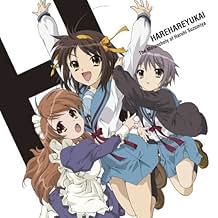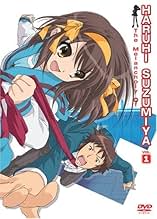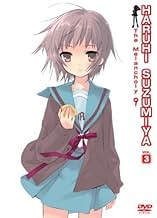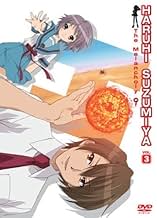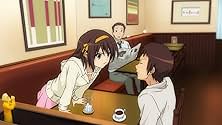La Mélancolie de Haruhi Suzumiya
Original title: Suzumiya Haruhi no yûutsu
- TV Series
- 2006–2009
- Tous publics
- 24m
The crazy adventures of the SOS Brigade, led by the insane but charismatic Haruhi.The crazy adventures of the SOS Brigade, led by the insane but charismatic Haruhi.The crazy adventures of the SOS Brigade, led by the insane but charismatic Haruhi.
- Awards
- 2 wins total
Browse episodes
Featured reviews
10wictor
Suzumiya Haruhi no yûutsu (The Melancholy of Haruhi Suzumiya) might at a first glance make you think that this is just another animated school comedy/drama. Well, it's not! The setting just happen to be a school environment. This is a comedy alright, but a very smart one with a lot of sarcasm. And the characters does have a psychological sublimeness which is almost in the same class that can be found in the works of Ingmar Bergman. The episodes is aired, as it seems, out of order, i.e. the pilot is in fact episode 11. This makes it possible to present small clues to upcoming episodes. The show is an adaption of Nagaru Tanigawa's popular novel series about Haruhi Suzumiya.
What about the story then? Like in all the episodes does the story revolves Haruhi Suzumiya, who tries to ease her own boredom by embarking in adventures. Haruhi her self has no interest in ordinary humans, and actively searches for aliens, time travelers and espers (persons with supernatural forces). To find this sort of people she has formed a club which she calls the SOS-Brigade (Save the world by Overloading it with fun: Haruhi Suzumiyas Brigade). Except for Haruhi, the other members of the SOS-brigade is Kyon. He is the real protagonist of the show. It's trough his point of view that we follow the story. He just happen to sit in front in class when Haruhi came up with the idea to form the SOS-Brigade. He is quite sceptical to most club activities and tags along just to ensure that Haruhi don't go to much to the extremes, and he is the only one in the class that Haruhi likes to talk with. Another member is Yuki Nagato, which is the "indispensable silent member" and is also the only remaining member of the Literature club, which room the SOS-Brigade has occupied in the quest for a free club room. She doesn't mind that the SOS-Brigade uses her clubroom, as long as she can sit in a corner and read her books. She also participate in the brigades activities. Mikuru Asahina was "voluntarily arrested" by Haruhi because the club needed a Lolita-like mascot for anything suspicious to happen. She often act as the clubs maid. The last member is the always smiling Itsuki Koizumi, who happens to be the "mysterious transfer student" (meaning he transfered two months in to the semester which Haruhi finds to qualifies as mysterious).
Haruhi thinks that all members but Kyon are some random picked people in school, but the do indeed have their own interest in her.
What about the story then? Like in all the episodes does the story revolves Haruhi Suzumiya, who tries to ease her own boredom by embarking in adventures. Haruhi her self has no interest in ordinary humans, and actively searches for aliens, time travelers and espers (persons with supernatural forces). To find this sort of people she has formed a club which she calls the SOS-Brigade (Save the world by Overloading it with fun: Haruhi Suzumiyas Brigade). Except for Haruhi, the other members of the SOS-brigade is Kyon. He is the real protagonist of the show. It's trough his point of view that we follow the story. He just happen to sit in front in class when Haruhi came up with the idea to form the SOS-Brigade. He is quite sceptical to most club activities and tags along just to ensure that Haruhi don't go to much to the extremes, and he is the only one in the class that Haruhi likes to talk with. Another member is Yuki Nagato, which is the "indispensable silent member" and is also the only remaining member of the Literature club, which room the SOS-Brigade has occupied in the quest for a free club room. She doesn't mind that the SOS-Brigade uses her clubroom, as long as she can sit in a corner and read her books. She also participate in the brigades activities. Mikuru Asahina was "voluntarily arrested" by Haruhi because the club needed a Lolita-like mascot for anything suspicious to happen. She often act as the clubs maid. The last member is the always smiling Itsuki Koizumi, who happens to be the "mysterious transfer student" (meaning he transfered two months in to the semester which Haruhi finds to qualifies as mysterious).
Haruhi thinks that all members but Kyon are some random picked people in school, but the do indeed have their own interest in her.
8cvr2
At first sight this is yet another highschool anime with lots of excuses for 'fanservice', but there is a lot more going on. The 'fanservice' is part of the plot, the main character is a tired cynic (unusual), and most importantly there is a clever plot that ties all the episodes together, and that poses some interesting questions. The episodes are deliberately non-chronological, and it is certainly worth watching the series again in chronological order.
The series is worth watching carefully, because there are a lot of casual hints in there that foreshadow and explain things, plus a good number of in-jokes about other series, anime and other.
The series is worth watching carefully, because there are a lot of casual hints in there that foreshadow and explain things, plus a good number of in-jokes about other series, anime and other.
This show is great. Not only is "Haruhai Suzumiya" a very well written anime show, it also reflects things like Philosophy, Science Fiction and a little religion. It's hilarious at some points and "cute" (for lack of a better term) at others. Actually this may be effect to my lack of experience with Japanese anime shows, but it is one of the best of its genre I have seen.
I mainly have to give credit to the writers. I haven't seen such brilliant scopes of imagination in a television show since the original Star Trek. I hope the writers continue to add strange new characters and give more insight on the already great characters that have been added.
9/10
I mainly have to give credit to the writers. I haven't seen such brilliant scopes of imagination in a television show since the original Star Trek. I hope the writers continue to add strange new characters and give more insight on the already great characters that have been added.
9/10
Okay, let me start off by saying that, on the whole, I don't like anime very much. I've enjoyed a couple of the oft-cited "classic" series, but regard the medium as a whole in exactly the same way that I do American television: namely, that a good 90-95% of it is utter tripe, with the remainder falling anywhere from "watchable" to "decent." This being the case, it's no wonder that I don't like the self-deprecating anime parodies out there. I don't get most of the jokes, and the medium itself enforces a certain style of humor that doesn't appeal to me at all - loud, hyperactive, lowbrow, and completely over the top.
So, when I started watching this series at the behest of a friend, I was primed for disappointment after the first couple of episodes. I figured that the characters were supposed to represent cliché characters from shopworn story outlines, and that their actions were supposed to be similarly satirical. I could kind of see where it was coming from, but didn't think that it was all that clever - lots of "wacky, fun-filled high-school shenanigans and goings-on, only now we're being ironic about it." At about the third episode, my opinion drastically changed.
It was at that point that the strengths of this series started to manifest themselves. The quirks of the non-chronological episode order, its snarky sense of self-awareness, and, above all, clever humor with (gasp) a well-executed straight man.
In what I consider to be a rarity in any medium, this show presents well-thought out, witty interactions between diametrically opposed characters. Protagonist Kyon's perpetual sense of vaguely annoyed resignation provides the perfect foil to the actions of title character Haruhi's generic "anime-like" exploits. It's a break from formula, and it works incredibly well.
Based on that strong foundation, the series further succeeds with a truly phenomenal level of attention to detail. As previously stated, the episodes air out of chronological order. I considered this to be a gimmick at first, but it works surprisingly well. The chronological sequence of events makes sense logically, but the aired order of the episodes more closely follows the traditional structure of Aristotelian drama. The order chosen leaves no narrative gaps that cannot be filled by simple inference (but while it is possible to guess what happened in an unaired "preceding" episode, one still feels compelled to watch exactly how those events unfold), and superb planning prevents any plot holes or contradictions. I watched this series a second time immediately upon completing it the first time, and I was amazed at how well even seemingly inconsequential events were all tied together.
The last point is indicative of the extreme attention to detail in every area of the series. While the stock "anime" character designs grate a bit, the background art is exquisite, realistically rendered based upon actual photographic references. Animation quality is also excellent at important points. For example there is a musical performance late on in the series in which the characters are shown actually playing a song - this may sound trivial, but the subconscious effect of watching (film-quality) animation which actually corresponds to the soundtrack is incredible.
In short, I love this series for some reason. By its very nature it is something that I generally dislike, but its execution is so unique and well-carried out that I can't help it.
So, when I started watching this series at the behest of a friend, I was primed for disappointment after the first couple of episodes. I figured that the characters were supposed to represent cliché characters from shopworn story outlines, and that their actions were supposed to be similarly satirical. I could kind of see where it was coming from, but didn't think that it was all that clever - lots of "wacky, fun-filled high-school shenanigans and goings-on, only now we're being ironic about it." At about the third episode, my opinion drastically changed.
It was at that point that the strengths of this series started to manifest themselves. The quirks of the non-chronological episode order, its snarky sense of self-awareness, and, above all, clever humor with (gasp) a well-executed straight man.
In what I consider to be a rarity in any medium, this show presents well-thought out, witty interactions between diametrically opposed characters. Protagonist Kyon's perpetual sense of vaguely annoyed resignation provides the perfect foil to the actions of title character Haruhi's generic "anime-like" exploits. It's a break from formula, and it works incredibly well.
Based on that strong foundation, the series further succeeds with a truly phenomenal level of attention to detail. As previously stated, the episodes air out of chronological order. I considered this to be a gimmick at first, but it works surprisingly well. The chronological sequence of events makes sense logically, but the aired order of the episodes more closely follows the traditional structure of Aristotelian drama. The order chosen leaves no narrative gaps that cannot be filled by simple inference (but while it is possible to guess what happened in an unaired "preceding" episode, one still feels compelled to watch exactly how those events unfold), and superb planning prevents any plot holes or contradictions. I watched this series a second time immediately upon completing it the first time, and I was amazed at how well even seemingly inconsequential events were all tied together.
The last point is indicative of the extreme attention to detail in every area of the series. While the stock "anime" character designs grate a bit, the background art is exquisite, realistically rendered based upon actual photographic references. Animation quality is also excellent at important points. For example there is a musical performance late on in the series in which the characters are shown actually playing a song - this may sound trivial, but the subconscious effect of watching (film-quality) animation which actually corresponds to the soundtrack is incredible.
In short, I love this series for some reason. By its very nature it is something that I generally dislike, but its execution is so unique and well-carried out that I can't help it.
Good animation, nice character design, and a light-hearted story make Suzumiya Haruhi no Yuutsu enjoyable to watch.
After my first viewing, I thought that this anime was pretty good, but but was much better on for a second watch.
This is because it is done out of chronological order, and once you re watch it in correct order you notice connections you didn't see before. (OR it may be that you see a second meaning to some events you didn't notice before) You may want to read the original novels (not manga) by Tanigawa Nagaru before/after seeing this. The anime is very good at visualizing every detail in the stories it shows.
However, there are some short stories from the book that are not animated, but are referenced to.(bamboo w/ wishes attached shown in episode 14) Overall, this anime is actually very good once after brief analyzation of the plot (reading the book improves upon it as well). It is a nice break from the shounen-jump anime that seem to be taking over.
After my first viewing, I thought that this anime was pretty good, but but was much better on for a second watch.
This is because it is done out of chronological order, and once you re watch it in correct order you notice connections you didn't see before. (OR it may be that you see a second meaning to some events you didn't notice before) You may want to read the original novels (not manga) by Tanigawa Nagaru before/after seeing this. The anime is very good at visualizing every detail in the stories it shows.
However, there are some short stories from the book that are not animated, but are referenced to.(bamboo w/ wishes attached shown in episode 14) Overall, this anime is actually very good once after brief analyzation of the plot (reading the book improves upon it as well). It is a nice break from the shounen-jump anime that seem to be taking over.
Did you know
- TriviaOriginally, the episodes were intentionally aired/shown out of sequence. What was shown as Episode 01 is actually Episode 11. In the 'coming soon' blurb at the end of each episode, Haruhi gave the chronologically correct number of the next episode, and Kyon 'corrected' her by giving the 'wrong' episode number - the one that corresponds to the order it is being shown in. When new episodes were produced in 2009, the whole series aired again, this time in chronological order.
- Quotes
[Haruhi has been told that her plot to frame the Computer Brigade leader of harassing Mikruru will fail because so many witnesses will deny it]
Haruhi Suzumiya: Then I'll tell everyone you thugs gained up on her and
[bleep]
Haruhi Suzumiya: ed her!
- Crazy creditsThe Character Haruhi Suzumiya is listed as ULTRA DIRECTOR.
- Alternate versionsFor home video release and the 2009 re-run in Japan, newly animated scenes were added to some first season episodes to make them more faithful to Nagaru Tanigawa's novel.
- ConnectionsFeatured in Adventures in Voice Acting (2008)
- How many seasons does The Melancholy of Haruhi Suzumiya have?Powered by Alexa
Details
- Release date
- Country of origin
- Official sites
- Languages
- Also known as
- The Melancholy of Haruhi Suzumiya
- Production companies
- See more company credits at IMDbPro
Contribute to this page
Suggest an edit or add missing content



